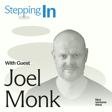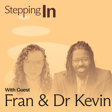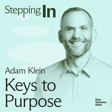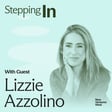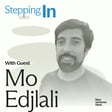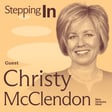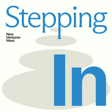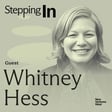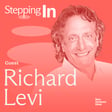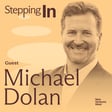Become a Creator today!Start creating today - Share your story with the world!
Start for free
00:00:00
00:00:01

Walking into Vocation
How do you navigate the challenging journey of finding your authentic vocation amid the pressures of success and expectations? In this intimate conversation, Adam Klein & Amiel Handelsman discuss Amiel's evolving path from leadership development coach to podcaster and writer, exploring the internal tensions between pragmatism and spirituality that shaped his work. Through candid discussion of his practices, fears, and transformations, Amiel reveals how listening deeply to life's calling requires both fierce dedication and humble surrender. This episode offers profound insights for anyone grappling with their own vocational evolution, highlighting how true purpose emerges through patient attention to what wants to be expressed through us.
Transcript
Introduction to Stepping In Podcast
00:00:07
Speaker
Hello, everyone. Welcome to this episode of the Stepping In podcast, a show where we look at integral coaching and all the ways that it can support us in navigating this complex and really sometimes crazy world we're in.
Living into Vocation: Amiel Handelsman's Insights
00:00:21
Speaker
In this episode, I'm joined by graduate Amiel Handelsman and we look at this question of what does it mean to like live into vocation or sometimes called discover our purpose and really lean into it.
00:00:34
Speaker
So for me, it was a really enriching conversation around discovering and listening to our life. And I hope you enjoy it. Well, I'm super happy to be talking with you today. um And this has been a kind of a long time coming. You know, we've been trying to get together for at least a few months now. Yes. Yes. I'm glad we're we're pulling it off. Yeah.
Personal and Professional Life: Shifting Focus
00:00:59
Speaker
I mean, as a start, I just love to hear what are you up to these days?
00:01:04
Speaker
Yeah. Well, I'm now living in Ann Arbor, Michigan, which is where I grew up after 21 years on the West coast. So geographically I'm in the Midwest in a college town. Um, I live with my wife, Julie, who is a New Ventures West graduate and diamond approach teacher, which means I have to be really I'm my game in public now that I'm married to a teacher. I'm an approach and in private. And we have two sons, Jacob and Xander, and I'm still coaching, although much less than I used to. And I'm still doing leadership development, mostly teaching and facilitating. And I'm writing and podcasting.
00:01:55
Speaker
Fantastic. Yeah, I remember you mentioning that big milestone for Julie. That's significant. It takes a long time. takes on A lot of practice.
Exploring Vocation and Global Challenges
00:02:09
Speaker
I know one of the things I was curious about and one of the things we do I like to focus on in the show is like the journey people have been on and in particular what they're learning about
00:02:22
Speaker
what wants to come through them into the world you know sometimes it's called vocation the way in which they feel like what's their contribution to make. And we were chatting about this a little bit. I think it's one of the things that contributed to my excitement for getting us scheduled is your own involvement and how you're understanding like what it is you want to be up to and bringing forward into the world. So even here in the introduction, you named you know coaching, but less, doing a little bit of leadership development, maybe a little less.
00:02:54
Speaker
And from what I understand, more focus on writing and you have this new podcast, how my view grew. So I'm curious like how you're understanding like what you want to bring forward into the world and how it's been changing over time for yourself. Yeah, I really appreciated that you were curious about that. And the timing is is great.
00:03:19
Speaker
because I'm in a period of unsettlement and exploration, which is a great moment to look back and look at today and maybe look ahead. I'm curious, is there a particular place you would want me to start that discussion?
00:03:39
Speaker
Well, maybe one place we can go is because I know it's fairly fresh is this new initiative you're on, the How My View Grew podcast that you started and maybe some of what precipitated that coming out. Absolutely. So How My View Grew is a podcast that I started in March and we're just about done with season one. And it combines a skill set that I've been using for 30 years.
00:04:08
Speaker
which is interviewing people and researching and preparing, along with some new skills, which is creating not just an interview, but a production. Fortunately, I have a producer to help me to produce, but he doesn't do it all. I learned to add narration and audio footage, so people, when we're telling people stories, they can have news shows or people speaking 30 years ago and have the listener kind of go back in time. That's very new for me. It's really wonderful and it's a lot of work. So on ah and sort of a skill set, it's mostly things that I've been familiar with and comfortable with and enjoy doing with a couple of new things. In terms of the focus, the focus is on big global messes, complex challenges.
00:05:07
Speaker
Democracy, climate change, Ukraine and Russia, Israel, Hamas, Gaza, Middle East. All really it's wrenching topics with some possibilities inherent in them, but very, very different as a language than how do we build effective teams and organizations or grow ourselves as leaders and people. Not completely different, but definitely different.
00:05:37
Speaker
And this curiosity about the world, this is not new at all. It's I'm finally dedicating something to it 100%. Over the years, i had an I've had a newsletter for 20, 25 years with different names. And I'm remembering the initial production quality of it, which is very simple today, but coming back 25 years ago, not great.
00:06:09
Speaker
And as I think about this podcast compared to the previous one, I'm not interlacing global challenges in between team leadership and organizational leadership. It is the main focus. And so it's an interesting question as to, well, why is that? And that's the question of location.
00:06:31
Speaker
Yeah, yeah, exactly. And I think it's Parker Palmer who says, you know, listening to your life is one of the ways to start to step in and discern like, what's my unique location in the world? And I'm curious as you were like, listening or, you know, you've been saying, I've been doing this kind of work for decades now.
00:06:50
Speaker
What were you hearing or what were you seeing that had you like more directly turned toward these big complex things without feeling the need to thread it into leadership or um otherwise um weave it into some other topic, but just really turn toward it more directly?
Midlife Reflections and Personal Development
00:07:07
Speaker
That's a great question. Just to reflect on that.
00:07:13
Speaker
I think since I turned 50 or since I became aware that I was going to turn 50, like six months before that, which is now going back for four and a half years, I became aware of, I felt like it's more than a halfway point in life, most likely, something about that date. And I started to feel quite a bit of anxiety and getting in touch with the fear of death.
00:07:43
Speaker
which Ernest Becker says we we deny death and we even deny the fear of death in many, many different ways and how we deny it changes from when we're a kid to teenager, young adult. So I began to viscerally feel it. It's a terror. It's an immense terror. And so that feeling, which I still periodically encounter, had me saying, oh God,
00:08:13
Speaker
And then I was, what, what if I died and what what hasn't been given, what hasn't been received and what hasn't been given. So that was one thing, what really matters. um A second is I noticed myself in one-on-one coaching, not being as interested as I have been before.
00:08:40
Speaker
Now I'm still coaching and when I coach people, I'm interested in them. So if any of my clients are listening, I'm interested in you. Um, something about it has, is felt different. Like I don't have enthusiasm to start with new people. And right now I'm just working with people that I've worked with in the past. It's very different.
00:09:12
Speaker
Yeah, often it's a case where coaches are, how do I grow my practice? How do I get more clients? And I'm hearing a contentment with what your coaching practice looks like these days. Absolutely. um There's also been an enthusiasm to speak. And this is really a big part of what we're looking at here with my writing and my podcast is that moving out of the place of I'm asking questions, I'm bringing forth other people's lives and supporting and challenging them and growing and and the podcast interviewing them and researching them and helping them give the best version of themselves.
00:09:57
Speaker
What's also emerging is, gosh, I have a lot to say and it is killing me. It's burning me to not say it. Really? yeah Like it's painful. And it's not only painful for me, but I'm an unpleasant person.
00:10:15
Speaker
When I'm not saying things that are coming through me, thoughts about the world, passions, perspectives, critiques, those are going into my conversations with my family and my friends. and they're leaked Things are leaking out. Power is leaking out in strange ways. Listen, this is what I've noticed. And I've not noticed it in that way. I've noticed it that when I feel like I'm expressing myself, I'm more pleasant to be around. It's only by writing more fully and Sharing my perspective even in my podcast that I realized for the next hour four hours a couple days Hey It's all good. I feel great. I don't need anything from people. I'm just here that's so different because when I need something and I'm not getting a chance to Respond to the call
00:11:12
Speaker
respond to the calling, then I'm looking for it in these other interactions. And that doesn't go so well, I think.
00:11:24
Speaker
Yes. Sounds like you're noticing it's not going well, or getting even feedback that it's not going well. Yes. The feedback has been there for a while. I just didn't know how to respond to it. Well, clearly it was their problem, but not yours.
00:11:42
Speaker
I think I knew that it was me. You know what to do about it. know what to do about You know how we say like each of us assumes it's either them or it's me. 90% of the time I assume it's me and there's a big super ego attack. It's just like, what do I do? yeah So now there's a way to, something to do about it. Right, right. So this is something I'm really curious about because as you've been talking,
00:12:08
Speaker
You know, you said around fear, like I really noticed this um deeper connection to fear around death and you palpably can feel into it. And then even here around noticing what it's like to not express yourself in the pain of not expressing yourself and how that shows up is like this thing that's in the background that then influences how you interact with people.
00:12:34
Speaker
So there's a way you're paying attention to yourself. And I don't know that this is something that everyone has access to, this level of sensing what's going on for them. And it seems like it's a real capacity or competency you're bringing to this question of like, how do I listen to my life? And what do I want to do as a result? So I'm curious if you could say just a little bit about what supported you in being able to pay attention at that level? Well, my wife, Julie, I mentioned before, is a big part of that. She listens really well.
00:13:20
Speaker
She has followed the trajectory of my experience And both of us have acknowledged that some of the conversations that I share with her are really old. Like I could have said the same thing 15 years ago. So I think it's trying to change. I think we're both noticing it's starting to change.
00:13:43
Speaker
So she has just held that space incredibly well. I am a student of the Diamond and Approach again. I was in the school for eight years.
00:13:56
Speaker
spiritual school created by H. Amas, for those who are Hamid Ali, for those who don't know, Karen Johnson, and so on. I left it for eight years, mostly for logistical reasons, but also because I just didn't like sitting around a lot in the big groups. My butt started hurt. I would stand up and stretch. And so I'm not in a big group now. I'm just doing one-on-one, but my teacher Frank has been enormously supportive. And I also worked with a therapist for two or three years before that. And it's all about like, well, what is what is this, what's happening right now? Just like getting curious about it and and feeling it. And so then I feel like right now I'm feeling a little bit of sadness. I felt a lot of sadness about like lost years.
00:14:47
Speaker
of like, God, I could have done this. And it isn't an inner critic attack. It's really just like a set a loss. It's like a grief. Cause I know what an inner critic, maybe 10% is that, but it's really, cause it's emotional, right? It's emotional. It's not angry. It's not, it's not this. It's like, it's loss.
00:15:10
Speaker
And so Julie and and and and and Frank, my teacher, and my before that, my therapist really helped me to to feel that. And then also is is anger. um Typically when I write something, it starts because I'm angry. And my goal is to express clarity on the page without anger. So I have to take,
00:15:41
Speaker
Keep the clarity. Subtract the anger. Piece of cake.
00:15:50
Speaker
Because there's this feeling of often I read something or hear something out of like, oh right? And so, and I want to kind of this, yeah like kind of a push back or punch. And what I end up, what ends up coming out is sort of a soft punch.
00:16:11
Speaker
um attempting to be more of a magnanimous polemic. And I don't know that it feels like a punch to me, but it is punchy. In other words, it's there's oomph to the writing. People go, whoa. And because I'm covering a half dozen perspectives in a given piece of writing, if somebody just encounters one that doesn't resonate for them, it's so fierce that they're like, oh, this is horrible. And they may not even get to a section of the essay that they'd go, oh, it's so great to hear someone say that. This has happened in ah my writing around Israelis and Palestinians and Gaza and Hamas and Iran every single time.
00:17:03
Speaker
I write something that happens and I say, hey, it's I probably wrote too long of a piece so you may not have gotten to this section yet. Why don't you have a look at this other one and then tell me what you think? And sometimes they do and they go, oh, I totally missed that. I was so angry about this other section. I didn't notice the other one. So I'm learning, I'm still learning probably shorter pieces of writing or better.
00:17:34
Speaker
Well, there's all kinds of social commentary we can be talking about with what you're saying so far around. Yes. Well, first of all, being able to sit with anger long enough to have it diffuse so that it's not the thing that's forefront and that clarity can come through. So how often does that actually take place in our world where most people are just, I'm pissed. I'm going to tell you how pissed I am. Not really feeling into like what's the deeper commitment or the thing that they're really wanting to say. Yeah.
00:18:03
Speaker
So there's a whole thing there.
Expressing Complex Issues with Clarity
00:18:06
Speaker
And then this other part about, do I have capacity to stay with however I'm feeling and keep going? Like with this essay I'm reading? Or am I just going to be like, nope, done?
00:18:22
Speaker
Yeah. Yeah. so't that Yeah. Well, there's a couple things there. The first one I'm really interested in is um what's the deeper commitment that you're holding that has you want to stay in your anger?
00:18:35
Speaker
let it process so that you can find whatever clarity is there and then express that because that doesn't come without real intention. Yeah, there's two come to mind. One is about how I engage and the other one is about the result of the world. um For how I engage, I've been calling it fiercely nuanced. So the commitment that I really feel is to capturing multiple perspectives with oomph.
00:19:05
Speaker
so that it's more interesting to read or listen to. And yet oomph often comes from a single singular, single,
00:19:17
Speaker
narrow polemical. And so I have multiple polemicals in individual pieces. And so my hope, my commitment is to provide some clarity
00:19:33
Speaker
to illuminate, it's like my five wing on the Enneagram, the illumination of cutting through a lot of the confusion and capturing partial truths and different perspectives. For the sake of people who are going, oh my God, it's so polarized. Everyone thinks they're right and the other person is wrong and hopefully feeling, ah, it's so great to see someone who's here with the complexity.
00:20:02
Speaker
Now, the number of people who actually want that is relatively small. If I wanted a bigger audience, I'd be a much smarter about it, right? but well You would just be angry and loud and say it over and over and over again. yeah Yeah. It might be worth trying that. I just can't bring myself to it. Maybe, maybe, maybe one day. So in terms of my Method and how what I'm trying to create between me and other people in the conversation. That's it's fiercely nuanced In terms of the world and this is where I feel more emotion It's Helping people have their lives turn out better hmm basically and there's a
00:20:54
Speaker
Fairness element that comes back from me being like a little kid that was picked on and then Protected other people who are getting picked on which Never provided any satisfaction or rewards only created enemies, but it was still a commitment like somebody's getting picked on I'm i'm gonna stand in there That impulse that everybody would have a fair shot just like unfairness in the world And people have inner and outer barriers. Unfairness doesn't mean the system is all bad, but not everybody gets the support that they need for their own inner development. So, and then there's a lot in the outer realm so that each person, each child growing up has a minimally decent life. This is a term I picked up from a book
00:21:52
Speaker
20 years ago called the 2% solution. It might be a different number, but I think it's 2%. The basic premise was, look at all the things we could do if we took 2% of the US federal budget and just dedicated it to ensuring that every person in the United States has a minimally decent life. Notice the language, minimally decent. There's a threshold, there's a floor. So that means you have shelter, food,
00:22:23
Speaker
schooling, basic healthcare, prenatal care, and so on, childcare. It doesn't mean everyone's equal. it' not It's not about evening everything out in terms of results, but it's in setting a basic floor. And to me, that's like, why aren't we doing that?
00:22:44
Speaker
We're having arguments about whether we should be equalizing things and whether that cuts off opportunities for entrepreneurs and so on. When the conversation that really is interesting to me is just like, what's what's a minimally decent life? How do we define that? And what can we provide outside and inside of people or help them provide for themselves to do that? So everything I'm writing about, Middle East, Ukraine, democracy, it's about that.
00:23:16
Speaker
Yeah, those are two big commitments. The first one in particular around, um to me, what was coming up is this analogy of like a garden full of weeds. And you're willing to sit there and sort of weed things out so that we can get to like what's the true harvest in this whole thing. So sorting through the noise, doing that hard work, surfacing the nuance,
00:23:41
Speaker
which takes a lot of dedication, not just intellectual dedication, but as you were talking about, there's lots of anger there. And how do I stay in that, get to whether the truths that are here and say it with oomph. To me, that means like, how do I have the pertinent part or the part that is life-giving, not get lost, but get communicated? Most weeding does require oomph physically. Like yeah you got to get in there and pull it out or you get that little,
00:24:12
Speaker
shovel or whatnot, you're you're pulling that out. What's that little thing called? I always call it a little shovel, but there's another term for it. There's another term. Wherever it is. oh You can tell we're really experts gardeners here. i I do it. I just don't know what it's called. yeah Unfortunately, I think it's TRO something. Maybe some of your listeners will be like, guys, wake up. Educate yourselves. What are you doing with your lives? But but the thing about weeding, and I'm so glad you said that, is Weeding is different from planting seeds. Maybe I plant some seeds. The thing about weeding is there there needs to be some trust that someone is planting seeds and applying water and sunshine. I can't do it all myself. And as I say that, I feel very sad. It's very humbling because one of the
00:25:06
Speaker
challenges I've had. It's been a occlusion of sight. It's been a a blinder. It's a grandiosity. hello It's the two-year-old at age 50, almost 54, thinking, I'm going to do all this. I can feel it. it used I stopped drinking coffee. It would always happen to 20 minutes after a cup of coffee. I got it. I can do it all. It's going to happen today. And then another 25 minutes later, well,
00:25:36
Speaker
I'll get some of it today, tomorrow. it's Well, it's great for initiating and extending. You just got to do it in that 30 minutes and then there's a crash. yeah So I got off that cycle and all respect to the coffee drinkers out there. Different strokes for different folks. And that grandiosity, whether it's from caffeine or something else, got it. It also it create it just creates, and again, I'm centered at type six in the Instagram. So there's this just constant mental churning. Am I doing life right? Am I doing life right? Until I come back from the body and then the emotions. And the grandiosity then feeds into that, which is that not only am I doing right life right, it's I'm supposed to be doing something really big. Maybe my dad's voice comes into play, or who knows, someone's voice comes into play from an early age. You gotta to do something big with your life.
00:26:36
Speaker
And then, you know, that comparison, a comparing mind comes in. I still work with that. Yeah, yeah. But again, you're pointing to this, I'll highlight it for me at least, ah essential, I'll call it a capacity of listening.
00:26:55
Speaker
So seeing the seeing the grandiosity for connected to some maybe patterns from childhood or whatnot, and then coming back to, well, okay, but what ah what do I really wanna contribute here? And what can I contribute here? And what's the sustainable thing that wants to come through? How is life wanting to speak through me? And it is, to use your word humbling, I would also say it's confronting where we have to turn towards something and be like, yeah, that I have to let go of. I have to let go of this,
00:27:25
Speaker
inner impulse that inflates me that says I can do everything or I want to do it all and that's the thing I need to keep chasing to let that balloon go, so to speak. It's not easy. And I'm curious like what supports you in letting that go and turning toward these commitments of you know, we've been talking about this one where we got started of weeding the garden so the truth can be evident. Well,
00:27:57
Speaker
A couple of things are coming to mind, Adam. One is an actual experience that I've had, and the other is an imagination, a moment of imagination. So the actual experience is doing work that, or being engaged in activities that really are meaningful and engaging. To use two of the three definitions that Martin Seligman gives for happiness, the engaged life,
00:28:24
Speaker
Pleasurable life and the meaningful life. So it's engaging. I feel like I'm in the flow and it's meaningful It feels that my heart is alive with the results of the work. They just like it matters to me And so I'm like, what what is all that other stuff like grandiosity? It's not Who needs all that stuff like this this is it this just feels great there's nothing else necessary so that's an actual experience that I have and then there's This is really in the last few months imagining what if that grandiose scenario came to pass what is that what does that look like so what what would that be like and i realized it's basically i'm famous i'm hanging out with really famous fascinating people i'm not hanging out with fascinating people who aren't into big ideas i'm hanging out with
00:29:21
Speaker
public intellectuals and and there is a constant stream of people sending me positive messages and my podcast is incredibly popular and my writing is published in big places.
Finding Meaning and Fulfillment
00:29:44
Speaker
Actually, as I describe it, it sounds pretty good.
00:29:50
Speaker
So this is a good part of that. um And then in terms of impact on the world, which I care about, I actually don't know how much impact that would actually have. Like the real amazing thought leaders out there who are constantly on the speaking circuit, I don't know that I'd be feeling any different.
00:30:16
Speaker
I get a lot of positive hits, positive, um what we call them, strokes, positive strokes, because there's a lot of people saying, oh, you're great. Oh, I love your thing. And I need a minimum amount of that, I've realized. Like if I write something and I get an email and someone describes what impact it had on them, that makes my day. I only need one or two per day.
00:30:42
Speaker
People are getting a thousands of those per day. That's just more email and text to sort through. So it's kind of becoming aware of who needs all that. It's like we're saying, a minimally decent life. You need a certain amount of money, resources, and then there's something well beyond that. We know it doesn't make people happier. And I'm finding that as first season of the podcast continues and I continue to write, just need to do it a little more. Do it a little more frequently.
00:31:16
Speaker
So that's the second the second part of it, I guess. um been I mentioned your name earlier, but I want to bring it in now and read the whole quote because I think it's a lot of what we're speaking to. It's from Martha Graham, who is a choreographer and dancer. And she said, there is a vitality, a life force, an energy, a quickening that is translated through you into action.
00:31:43
Speaker
And because there is only one of you in all of time, this expression is unique. And if you block it, it will never exist through any other medium and it will be lost. The world will not have it. This is the part I think that I was really clueing into when we were talking. It is not your business to determine how good it is nor how valuable nor how it compares with other expressions. It is your business to keep it yours clearly and directly to keep the channel open.
00:32:17
Speaker
More of that, please. I mean, that's beautiful. It is beautiful and to me, inspiring and hopefully um inspiring for others. The other thing that it feels to me is liberating.
00:32:35
Speaker
Because it, and I think you've been speaking about this just through your own life, allows for like really turning toward, well, what's really important that I want to pay attention to internally and turn in myself? And what do I want to do about that? And how do I want to express that into the world? And not be so concerned about how big it is, how grandiose it is, or how small it is. But really, just what do I want to do?
00:33:07
Speaker
and making sure that it does have a certain level of minimum viable life, like there does need to be money that comes in because we do need to pay bills and buy food and all of that. But to keep all of that woven together.
00:33:27
Speaker
And the thing I've been highlighting is like this way that you're paying attention to like, what's the life inside of me? And when do I notice that that gets amplified? And Nurtured and when does it start to go dim? Yes or subdued? Yeah Yeah, I want to respond to that. I just want to Set as a placeholder for a couple minutes from now about what makes that hard to do. is Yeah coming to mind There the word liberating is great because that's what I was feeling She's basically saying this is for you Right
00:34:07
Speaker
Right. It's OK. It's OK to do this and it's OK not to do that. Right. That's a great. That's a great when someone tells you that, whether it's a friend to your face or Martha Graham for the. Is that from a book? I think it's from a talk she gave talk. Either way, it's it's very, very.
00:34:30
Speaker
It's very freeing. I mean, I felt really, really warm. Now, one of the things that makes it hard to notice that, we've gone through several of them. And maybe this is sort of my shtick in life is like, here's why things are hard. just It comes up and then it's like, okay, and here's what you can do about it. Here's the practices. But I start with, here's why it's hard, is is if you've built a line of work or a group of friendships or a network, and those people know you in a certain way,
00:35:00
Speaker
They reinforce the sense of self. You feel the sense of self. They don't only reinforce the sense of self, but they make requests to you. This is true for people, let's say, who are alcoholic, and they're around people who drink. And they keep getting invited to go drink, and they're trying to stop. And we know they have to start declining or counter offering, and then getting to know new friends, making new friends. That's kind of obvious, in a sense.
00:35:27
Speaker
um If you want to play a new sport, you can't learn how to play tennis by playing hanging out with football players, unless they also play tennis. You have to play with tennis players. And so here for me, gosh, I've been in the leadership coaching and development community for a very long time. In essence, 30 years, although I would say
00:35:54
Speaker
2000 is when I moved, the spring of 2000 is when I moved to San Francisco. And in my first three weekends there, one was a round table and the other was me being a guest client. Boom. First three weeks. Yeah. Those are both a New Ventures West offers. Thank you. New Ventures West offers and they were great offers.
00:36:20
Speaker
And it's one of the best things that's happened in my life, um being part of the community. You can see I'm feeling a lot of emotion around it.
00:36:32
Speaker
um And for two or three years in San Francisco, when I was the person that answered the phones and was thinking about business development, I felt like I was sort of at the center of the community.
00:36:52
Speaker
And so people know me and I knew them and it felt really good. And that continued for a long time with New Ventures West. And and then in my work with with companies and clients, that's what I'm known for. What do you do? I coach leaders, I work with teams. I don't know that I can assert that today accurately.
00:37:18
Speaker
So I've had to change what I say, which is hard. Plus, I've never been overwhelmed with work. I used to say, God, it'd be great to get four requests for every one that I accept. That's never been the case. And I still am getting requests and from people wanting leadership development support, often from like affiliate firms rather than the clients.
00:37:46
Speaker
because that's what I'm known for. And so that makes it hard. People want you to keep doing something that, wow, it's a blessing to be good at it, to be known for being good at it, to have enjoyed it for so many years, and then to be a bit more circumspect, to take a pause.
00:38:07
Speaker
before saying yes. I mean, I'm in conversations with three different companies right now about, but and it also, you know, it is money. Sure. So that, I think that makes it hard. And so you have not only the sense of self, sense of identity, sense of status, you know, David Rock, neuro leadership, the brain writes its status.
00:38:37
Speaker
in the brain is an essential social need. It should be at the bottom of Maslow's hierarchy. Status, autonomy, relatedness, fairness, and so on. So I have a status that I kind of wanted for a long time. Now I have it. Not that everyone knows me. People are still like, who are you? How can you help us? That happens. But there's a status. And so it's like letting go of that is is difficult.
00:39:06
Speaker
um
00:39:14
Speaker
And what keeps what keeps it or what keeps you going? What helps in the midst of that? Because I imagine just for listeners, there's probably so many people who are like, man, yeah, listening to my life, listening to this inner thing, that all sounds great. I don't have time to do that. Or what does that even look like? Yeah, this may not be a very satisfying and conversation, perhaps. ah Granted.
00:39:42
Speaker
But I think well um think the background to my question is trying to surface things that you've been up to that have been helping this all along. oh So yes, you've been doing these things for 20 years, for example, like leadership development and coaching. And that also arises out of a particular way of like living a life that would allow you to meet clients and do work with them.
Practices for Personal Growth and Well-being
00:40:07
Speaker
So just more to the like background in New Ventures West, we're big on practices. like What are the things that help cultivate things inside of us that allow for this kind of... way of listening, making hard decisions. And you spoke about a couple earlier, you know, working with the therapist and Diamond Heart teaching. I'm wondering if there are other ways in which you support yourself being in these things that make it hard. Yeah. All right. Now thank you for the background context. Now and I understand what you're you're asking and the practices I'm describing may be as useful for building up a coaching practice. Yeah.
00:40:52
Speaker
Since 2000, when I discovered the life we are given by Michael Murphy and George Leonard, two pioneers in human potential movement, personal growth, I've been doing some version of a morning practice that involves breathing, centering, grounding, little yoga. So that's been a constant.
00:41:21
Speaker
I do a truncated version of it now, but it's a constant. um
00:41:29
Speaker
I don't drink any alcohol. I gave up coffee. I still do a little black tea, and those helped me avoid the spikes and crashes. Still have some addiction to sugar, but it doesn't create the same type of crash.
00:41:51
Speaker
It's really hard to do any of this when you're crashing from a caffeine high or you have a headache because you've had a few drinks the night before. If I had half of a beer right now, I'd probably be like all loopy because I just haven't done it for so long. yeah Sleep has been a really important part, something I ask all my clients about.
00:42:18
Speaker
not just because it's been a challenge for me because that would be the mistake of treating our clients as ourselves. It's more that sleep is a big challenge for many, many people. you And the standard that we use to assess ourselves as having slept well is too low. Oh, I got six hours. Yeah, that's generally not enough. yeah And the big thing was
00:42:43
Speaker
This may be helpful to folks, not necessarily in the area of sleep, but acknowledging I've got a physical thing that needs to be attended to. Like I have an issue. And I, at one point, my wife said, why don't you talk to someone? So he has sleep apnea. And I was so resistant. I didn't want that. I didn't want that. um felt like a pathological label. I don't want to be a person with sleep apnea using a CPAP machine and putting a mask on every night. I don't want to be that type of person. Well, when I went and talked to him and heard his story and I was helping him, like, oh, there's a possibility here, new possibility. And so I went and got tested and sure enough, I had sleep apnea.
00:43:32
Speaker
So I started using it, and I've been very compliant, as they say.
00:43:38
Speaker
You got to be compliant. But I think that a lot of us have things, as you said, being confronted with like she confronted me with it and my own just moods in the morning confronted me with it. There's something here that needs to be attended to. And so now that is a practice. I mean, it doesn't the mask doesn't put itself on. Right. The little water tank doesn't refill itself with distilled water. And when I travel to other countries. The hotel doesn't have distilled water in my room for me.
00:44:09
Speaker
right to go out and get it. So that's... um There's a lot more, but maybe that gives... that's some Yeah, that's a great i think overview. yeah And the other thing I'm appreciating as you've been talking, because you've been talking about this time span of 20 years, 30 years, 25 years.
00:44:30
Speaker
be it's long It's a long-term commitment. and there's like small evolutions of listening and shifting and changing and some of them are micro and then they kind of lead to a big change where or more noticeable pivot but that noticeable pivot didn't just appear out of nowhere it's been supported by small things along the way little ways of listening little ways of turning towards sleep or diet or food or intake, practices in the morning. So the ah consist I guess what I'm getting to is like consistency over a long time really supports some of what I'm feeling in this more now, like more externally externally noticeable shift or pivot in how you're you know your work is showing up, but it didn't just appear.
00:45:29
Speaker
yeah so
00:45:33
Speaker
interpreting my story as a case for ongoing long-term deliberate practice would be a good and hopefully useful interpretation. I want to just say a couple of things about that because I have dived into deliberate practice as not taking it from Buddhism or something like that, but taking it from sports, music, performing arts, math, that reps matter getting in your reps, whatever it is your practice really, really matters. And having the intention to improve or grow really matters. um At times with my strength training, I've actually dedicated a session to someone or something. Like I dedicate this to my father-in-law or I dedicate this to
00:46:22
Speaker
harmony. It really changes the practice just to say upfront, I dedicate. You know how long it takes? What does it take? Five seconds. yeah right but Suddenly the whole of the practice has an entirely new meaning. It's not just, okay, I'm going to do five of these and 10 of those. It's for someone. It's not just for me. It's for the sake sake of someone else. It's so helpful to have the intention to dedicate it and because every practice Not every practice. Many practices that are useful are hard and you want to stop. And as George Leonard taught us, you hit the plateau. When you hit the plateau, you often want to stop because either it's not cool and fun and groovy, or you're not seeing improvement. And yet the plateau is where actually a lot of growth happens. And so it's much easier, in my experience, to stay on the plateau where you're putting effort in, or at least practicing,
00:47:20
Speaker
and not seeing a lot of outer results, it's easier to do that if it's dedicated to something larger than you, which is why this whole conversation we're having around vocation is so important. You dedicate your practice, it's so important. I was just exactly gonna say the same thing, like this dedication or commitment or orientation to something bigger than me.
00:47:42
Speaker
And then the beautiful part, and this is, I think, the beautiful paradox of vocation is, of course, it includes you. after you make that big dedication, you're like, it's not about me. And then you realize, oh, but it has to include me in order for this to work.
00:48:02
Speaker
Yes, it does. I once led this ah but me, us, all of us. There's me, there's us. People who are like me, my family, my tribe, my community, my religion, whatever. And then there's all of us, which just includes strangers, people very different
Reflective Conversations and Healing
00:48:16
Speaker
from me. And I just ah reminded me that 15 years ago, I went back to my old high school because I'm still friends with a history teacher there, who really influenced everything we've talked about, about caring about the larger world. And he was like the principal or class principal, and they had an annual leadership retreat. And he asked me to to come in and help with their annual leadership retreat. Like, what kind of senior year do we want to have? And so one of the exercises I had them do was based on this. And each person had three index cards.
00:48:48
Speaker
And it was me, us, all of us. And for each one of them, they had to write down one thing they wanted to to have happen this year. and it And for some people, the us and all of us was a stretch. That's me. It's all about me. And for other people, naming the me is hard. I'm here for others. And and I really emphasized for them because the school was saying, let's do it for the class. What do you want to do for your class? We got to include me. We got to include me. Yeah. Yeah. Yeah. I don't know if I'm borrowing this from someone, but I've heard it. The way I like to think about it, that's helpful for me at least is I can only give away what I have. So if I want to give myself to something, the more I have of myself, the more I can give to it.
00:49:42
Speaker
Excellent. Yeah. Well, I'm curious on you if there's anything else you want to share that we haven't already touched on as we're in this conversation about life trajectory, vocation.
00:49:55
Speaker
Well, I have a question which you're not going to be able to answer, but I am curious how listeners are hearing this. and what So for all of you listening, I'm curious curious how you're experiencing me and also what
00:50:13
Speaker
relevance this has for your life, maybe what insights it's providing you on the past, maybe what possibilities it's opening up or closing for the future. Like if there were a way to hear that from people, it'd be really interesting to me. Particularly the more I talk about my own experience,
00:50:36
Speaker
Well, it's it's said that when when people feel you, feel you're in your heart and sort of telling your story, it helps them to to experience their own story and to go through their own journey. So that's my hope in all this. It is healing. You are helping me to heal and grow, Adam, just in our conversation by being able to go through this together. Because I said, you've caught me at a great time. It's a great time for you to be asking these wise and compassionate questions. And I also hopeful that hope that it's um that it's helpful to others as well. Maybe that's the last thing I i have to say. ah Yeah. And I will meet you there and share that sentiment that it is. That it's like that moment when you read a book. This has happened to me. You're like, oh my gosh, this person is giving language to something that I didn't know was here. And there it is expressed in that it's like shining a light.
00:51:33
Speaker
allowing for growth, allowing for something to be seen. And we have to be very particular. If we just share a universal message, it doesn't help other people get into their particular circumstances. Right. So you're asking me about the vast, fascinating and at times disturbing idiosyncrasies of my life.
00:51:55
Speaker
Right. Legitimates that yeah for others. and Oh, what an interesting set of questions to be in. Yes, absolutely. I appreciate it very much, Adam. Yeah. Well, i' this has been an enlivening conversation for me, speaking to just what you're talking about. It's been I could feel my own like little life force inside growing and expanding like I feel fuller inside. I feel um motivated and inspired to keep on my own path and I think this speaks to something you were threading throughout like you started with this with Julie.
00:52:32
Speaker
having people in your life who reflect things back or who can see you and provide nourishment. So I'm feeling that in our conversation and how when life meets life, it amplifies and wants to help help it grow. So I'm noticing that. May I add one thing to that, which is we don't know what's going to happen in a conversation until we've had it. This is why we have conversations for relationship or shared interests. So you discover like,
00:53:03
Speaker
This began as you inviting me, or maybe I offered, I can't remember how it started, but somehow we agreed to do this. yeah And with a particular focus for this podcast, for this audience, and then you shared with me, it would be video, and I made sure that I looked half decent. And now that we're at the end of it, I'm saying,
00:53:31
Speaker
Thanks man. How much do I owe you? It's like, it's kind of like that kind of people used to say this to me in my podcast all the time. Like this is so healing. This is a great, like that's what it's like. Cause we don't know until we have that experience and are present with each other what it yields. So, uh, that's my, my last observation. Yeah. Well, and another invitation for us all to be in true conversation. And this is what can happen. Amen. Yeah. All right. I mean, well, thank you so much.
00:54:02
Speaker
Thank you.
